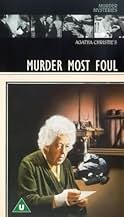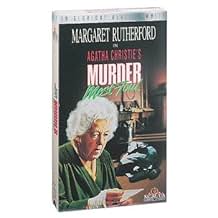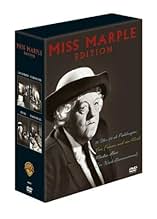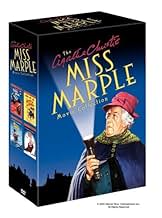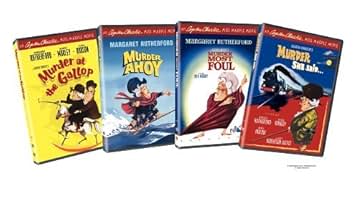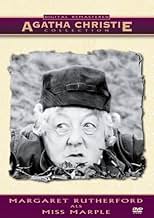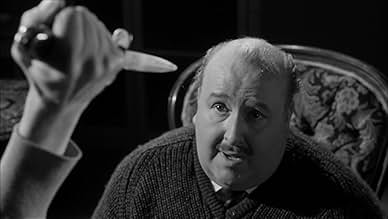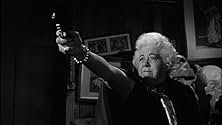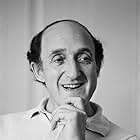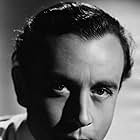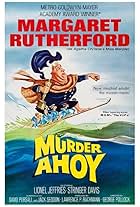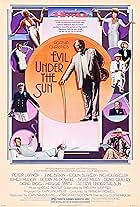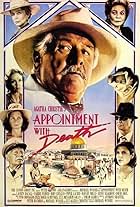IMDb RATING
7.1/10
6.5K
YOUR RATING
When Miss Jane Marple joins a theatrical company after a blackmailer is murdered, several members of the troupe are also dispatched by this mysterious killer.When Miss Jane Marple joins a theatrical company after a blackmailer is murdered, several members of the troupe are also dispatched by this mysterious killer.When Miss Jane Marple joins a theatrical company after a blackmailer is murdered, several members of the troupe are also dispatched by this mysterious killer.
Charles 'Bud' Tingwell
- Inspector Craddock
- (as Charles Tingwell)
Andrew Cruickshank
- Justice Crosby
- (as Andrew Cruikshank)
Neil Stacy
- Arthur
- (as Neil Stacey)
Storyline
Did you know
- TriviaMiss Jane Marple's audition piece for the Cosgood Players is her dramatic rendering of "The Shooting of Dan McGrew", a 1907 poem by Robert W. Service. Dame Margaret Rutherford was especially fond of the piece and reportedly once intended to give a reading of it at a women's prison to cheer up the inmates.
- GoofsWhen the two cats exit Miss Marple's room, a bird-like toy on a string can be seen moving in the background and up to the ceiling, attracting the cats so they'll follow down the hall.
- Quotes
Justice Crosby: Madam, either you will need to cease knitting or I shall need to cease judging.
- ConnectionsFeatured in Truly Miss Marple: The Curious Case of Margaret Rutherford (2012)
Featured review
George Pollock's name never gets mentioned among major directors. Yet four of his Miss Marple films as best remembered for Ron Goodwin's music and the wonderful Dame Margaret Rutherford and real life husband Stringer Davis.
The four films of Pollock combined mystery with comedy in a way that it entertains even after 40 years after the films were made. The elements that hold up these four films were great casting, good screenplay, crisp editing, and charming music and sound effects. Pollock is not a David Lean or a philosopher-director. He is merely making cinema that is gripping and entertaining and how well he accomplishes this.
This film is the second only to "Murder Ahoy" among the four. And since "Murder Ahoy" followed "Murder Most Foul", it would be only too clear that Pollock was gaining in confidence and elegance with each film. In each of his "Murder" films Pollock cast a major British actor. In this one it is the talented Ron Moody (Fagin of "Oliver!"). In each of the four films the chosen British actor provides a counterpoint and balance to Dame Rutherford's major role. One tends to remember Miss Marple and not the other meaty roles (Lionel Jeffries, Robert Morley, James Robertson Justice)in each of the "Murder" films. All the four were memorable but Moody and Jeffries were truly remarkable. I found this a major work of Moody though not as memorable as his interpretation of Fagin and Uriah Heep in other films.
The juxtaposition of crime and comedy looks natural thanks to Pollock and imaginative casting. Pollock is probably a quiet achiever deserving more attention by critics and historians of British cinema.
The four films of Pollock combined mystery with comedy in a way that it entertains even after 40 years after the films were made. The elements that hold up these four films were great casting, good screenplay, crisp editing, and charming music and sound effects. Pollock is not a David Lean or a philosopher-director. He is merely making cinema that is gripping and entertaining and how well he accomplishes this.
This film is the second only to "Murder Ahoy" among the four. And since "Murder Ahoy" followed "Murder Most Foul", it would be only too clear that Pollock was gaining in confidence and elegance with each film. In each of his "Murder" films Pollock cast a major British actor. In this one it is the talented Ron Moody (Fagin of "Oliver!"). In each of the four films the chosen British actor provides a counterpoint and balance to Dame Rutherford's major role. One tends to remember Miss Marple and not the other meaty roles (Lionel Jeffries, Robert Morley, James Robertson Justice)in each of the "Murder" films. All the four were memorable but Moody and Jeffries were truly remarkable. I found this a major work of Moody though not as memorable as his interpretation of Fagin and Uriah Heep in other films.
The juxtaposition of crime and comedy looks natural thanks to Pollock and imaginative casting. Pollock is probably a quiet achiever deserving more attention by critics and historians of British cinema.
- JuguAbraham
- Jan 25, 2003
- Permalink
- How long is Murder Most Foul?Powered by Alexa
Details
- Release date
- Country of origin
- Language
- Also known as
- Vier Frauen und ein Mord
- Filming locations
- Aylesbury Crown Court, Market Square, Aylesbury, Buckinghamshire, England, UK(courtroom in opening title sequence)
- Production companies
- See more company credits at IMDbPro
- Runtime1 hour 30 minutes
- Color
- Aspect ratio
- 1.66 : 1
Contribute to this page
Suggest an edit or add missing content



